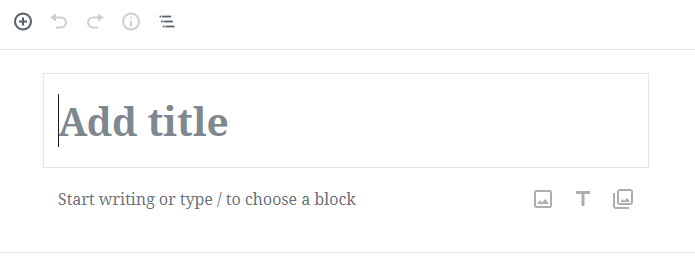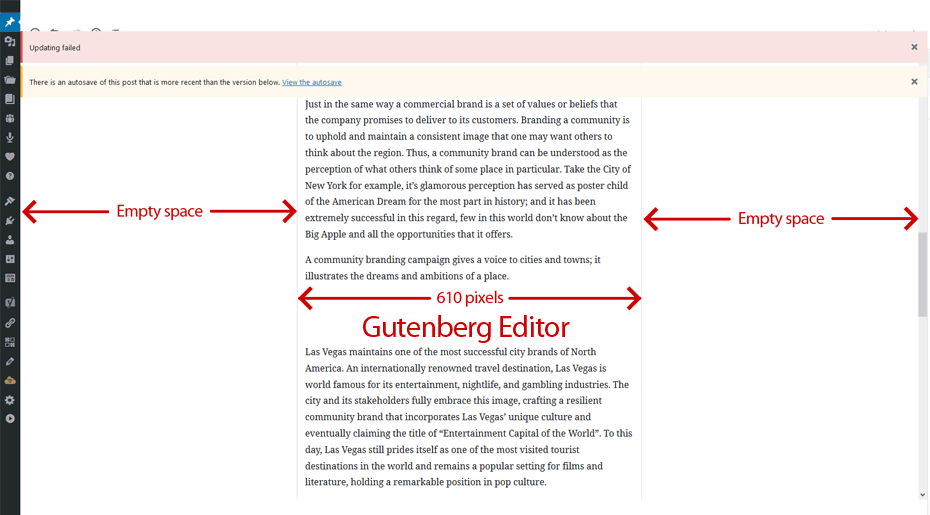There is a new WordPress visual editor that will soon be part of the WordPress core. It’s called Gutenberg and it is named after Johannes Gutenberg, a German inventor who invented the printing press. As of writing this article, WordPress 4.9.8 is the stable release. With the release of WordPress 5.0, Gutenberg will be the new editor that will replace the beloved visual editor in WordPress that we all know and love.

A block as seen in the Gutenberg editor.
The new Gutenberg editor is based on blocks. Each paragraph is considered a block. Each block can be a title, a paragraph, or any rich media content. I don’t want to go into too much detail because I’m sure you can find hundreds of articles on the Internet about Gutenberg. But simply put it, the new Gutenberg editor is a page builder.
Sounds exciting right? But am I looking forward to this release? Not really. Being a web developer, I am always excited to try new programming scripts and software that will make my life easier. But with the release of WordPress 5.0, I am not excited about the release of Gutenberg.

The Gutenberg editor measures 610 pixels in width. This is very narrow and leaves a lot of empty space when viewed on a desktop web browser.
Why you might ask? I have tried the Gutenberg editor and I am not impressed. For one thing, when I post a new blog article, I noticed that the new Gutenberg editor is very narrow. It is 610 pixels wide to be exact. What’s up with that? My computer monitor is 1920 pixels wide and this Gutenberg editor takes up only 610 pixels which leaves a lot of empty space on my desktop screen. That’s not efficient use of screen real estate if you know what I mean.
Secondly, the first time that I used Gutenberg, I got a warning message that says Updating failed just after 5 minutes of using it. Now, I really don’t know why it produced that warning but I suspect it has something to do with the autosave interval that I have set in my WordPress configuration file. Even though I have configured the autosave function to save every hour, the Gutenberg editor does not take that into consideration and attempts to do an autosave of my posts every minute or so. I find this very concerning. I later got a second message that says There is an autosave of this post that is more recent than the version below which I find very puzzling because I have customized the autosave function to save every hour – so why is Gutenberg autosaving my post just after 5 minutes of editing?

Error messages as seen in WordPress after using the Gutenberg editor.
As you can see, these are the reasons why I don’t like using Gutenberg. I suspect there are many issues and bugs with this plugin that I have not yet discovered. I have read the reviews on the Gutenberg plugin page and there are more negative reviews than positive reviews which lead me to believe that the Gutenberg editor has not yet matured.
Being a WordPress web developer, I find that Gutenberg is not a requirement for me because I do all of my edits using the text editor anyway. Gutenberg may be a great user experience for someone who does not know how to code. But for me, I find that it takes more mouse clicks to actually edit a post using the new Gutenberg editor than it does with the classic editor. That translates to inefficient use of my time.
One thing to keep in mind is that the Gutenberg editor applies to only the default post types in WordPress such as Posts and Pages. It does not affect Custom Post Types, at least not yet.
For now though, I will avoid using the Gutenberg editor and will install the classic editor that I am familiar with. As another option, if you’re like me and you don’t want to use the Gutenberg editor after WordPress 5.0 is released, you can install the Disable Gutenberg plugin which will disable the Gutenberg editor altogether. The funny thing about doing this is that people normally install WordPress plugins to add a feature…not disable a feature. It’s like installing a plugin to uninstall a feature. Sounds ironic doesn’t it?
So is this the demise of the classic editor? I think not, at least not in the near foreseeable future.
Written by Thanh Nguyen


